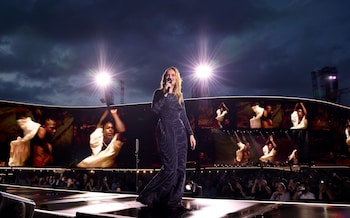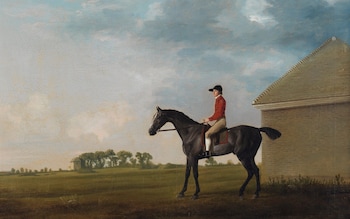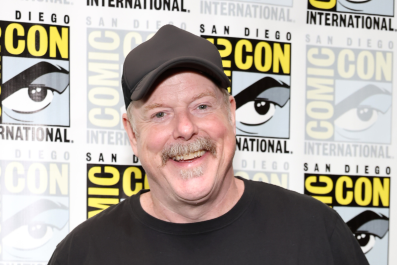Brazilian DJ ALOK is known for his addictive tracks and all-around feel-good music, earning over 5 billion streams and over 30 million monthly users on Spotify with 28 million Instagram followers. His 2024 album, The Future is Ancestral, was produced in collaboration with eight Indigenous tribes from different regions of Brazil to highlight their vibrant culture, a rare move by a major artist. Known for topping the "best DJ" lists year after year, his ultimate goal is to make the world a better place through dance. ALOK spoke to Newsweek's Ramsen Shamon after his hour-long Lollapalooza set.
Q_How did you prepare for your Lollapalooza performance today?
A_I was 15 minutes late. I played last night in Vegas. I came straight away. And the driver just left us at the hotel. I had to get an Uber. So I got an Uber to another place. I arrived on stage seven minutes before my show.
Was that the closest time you've arrived on stage before starting a performance?
No.
What was the closest? A minute?
Yeah, exactly. It [happened] two times. Once, I had a problem with the plane. It couldn't land. So I had to go to another airport. And the other [performance] was that we came from Canada to the U.S. And then, as soon as we [landed], my friend couldn't find his passport. It was in Canada. So we got on stage three minutes before [showtime].
Is this your first time in Chicago?
No, I've been here at TAO. Because I have a residency with TAO Group, in Vegas, and also here, and in New York.
So you've tried Chicago pizza and hot dogs already?
No, to be honest, I didn't. But I will. Today I will.
How do collabs work? Because everyone wants to work with you? How do you decide on who to work with?
Every collab is different. For example, there are songs that I receive the vocals, it inspires me, and then I produce it. The others, I [may] produce and then I have some songwriters and then we go after a singer to cut it, to interpret it. So it's different ways.
Is this done in the studio or virtually?
With the Indigenous I spent 45 days, full on in the studio. Every day in the studio.
Which city was the studio in?
In the mountains of Minas Gerais, Brazil, in the middle of nature—it was beautiful. But now I'm on the road, so I'm producing a lot of stuff on my MacBook in hotels and on planes.
You have a big Brazilian fan base. What message to you have for your Brazilian fans?
We have something in our culture, which is like, every time we see one of us [Brazilians] break the barriers and cross to the other place [of success]—it's kind of like, when I'm on stage, I'm not alone. We are all together. We represent each other. Many times we were taught that we were inferior. And what is superior is what comes from the U.S., or from Europe, so when we cross those barriers, we are always very proud of it. And we can all see now at the Olympic Games, when a Brazilian is winning, we are all very connected, very together. The message is: When I'm on stage, I'm not alone. I'm with all of them.
Will you ever do a collab with Brazilian artists Anitta or Pabllo Vittar?
This is a funny story. I think it was 2017, I took a picture with Anitta and we said we're gonna do a collab together. We had the song ready. And with the label issues it never came out. So every year, her fanbase and mine celebrate the anniversary of a non-released [song]. Laughs. So ya, we have to do something for sure.
How does it feel to be on those "best DJ" lists? Does it mean anything to you?
To many people it doesn't mean [anything], but for us as Brazilians it means a lot. It gives a good visibility for some places—in Asia, in South America [too]. So yeah, it's important for me.
How do you juggle your family and career? It's really great that you bring your wife and two kids with you while you're on the road.
That's the way I found out [how] to balance life and touring. Because at the end of the day, now my kids are still young, so they can still can come with me on the travels. But soon, I will have to change the strategy.
Let's talk about Brazilian culture. What's your favorite Brazilian food?
Açaí.
What do you have it with?
With bananas, granola, and whey protein.
Settle the debate. Which is the better city, Rio or São Paulo?
I live in São Paulo, for some reasons, and I like to spend holidays in Rio. Laughs. You know what I mean? But for my business it's better [to be in] São Paulo.
What's one culture shock being in the U.S. versus being in Brazil?
Back in 2014, I was in a very depressed moment in my life, looking for answers and inspiration. So I went to this very isolated Indigenous tribe, in the heart of the Amazon, with three flights, 13 hours in a row, 9 hours in a canoe. I finally got there and spent 10 days with them. And for me it was a life-changing experience, where actually a lot of my perspective [changed] about of my life, the world, and other stuff. Then in 2021, after a long time, I was asking myself, where is the future? And then came the answer—the future is ancestral. So at that moment I knew that I had to do this album, [The Future Is Ancestral], inspired by Indigenous roots.
You started a nonprofit called the Alok Institute. What projects are in the works?
Alok Institute is based on a feeling I've always had. In 2014, I went to the Indigenous tribe. I was doing songs to perform well on platforms, while they [the Indigenous] were doing songs for healing. [In] 2019, I was invited to become a character on a game called Free Fire. They asked me, "Which super power would you like to have?" And I said, "Can I heal people?" [That's] what I learned with [the Indigenous]. After that, I got my first [payment from the game]. And I realized I had a lot of money from my part, and I wanted to heal inside and outside the game. So I donated 100 percent of my royalties and I created the Alok Institute. So the Alok Institute is not a place where it's a structure and you go there and there's a lot of ... it's like a jet ski, it's not a transatlantic. We go to different areas and we sponsor in three different ways—with the money, with my image and visibility, and with co-creations. Alok Institute has projects in Brazil, India, and Africa. It's not only for the Indigenous, it's so many things that go around.
What inspired your song Jungle?
I always wanted to do a song with Chainsmokers. I got the vocals from a songwriter, then I produced it. And then out of the blue I sent them [a message], "Do you guys like this idea?" and I wasn't really expecting a positive [reaction] because it was a new kind of style, fast bpm [beats per minute]. And they really enjoyed it. And they came on board and they produced [the song] more. Then we got Mae Stephens as well to cut the vocals, which was very similar to the original—that was something that really matters to me, to keep the authenticity of the original. And in the end, it worked out super well.
What do you want to do in the future? Any upcoming projects?
I don't even know where I'll be [performing] next week. Laughs. But I'm just joking. For example, we are here today and then I'm going to Toronto, then Croatia, Romania, Portugal, and Holland in the next week. I'm now really focusing on handling all those demands at the global level. Because there's lots of demands in Asia, lots of demands in South America, lots of demands in Europe, U.S. So at this moment, I really like positioning myself on the international market in a way where the next year I can select [gigs] better.
Do you see a difference in what music audiences enjoy based on where they are?
Absolutely.
What are the differences?
It's totally different. Every country, even cities in the same country, have their own singularity. The songs that work here, might not work in other places, and vice versa. So you have to really understand where you're going.
Disclaimer: The copyright of this article belongs to the original author. Reposting this article is solely for the purpose of information dissemination and does not constitute any investment advice. If there is any infringement, please contact us immediately. We will make corrections or deletions as necessary. Thank you.




